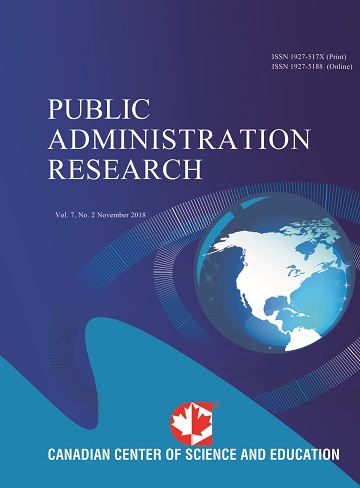Challenges Prevailing in Bangladesh Civil Service: A Brief Analysis
- Mengzhong Zhang
- Biswanath Bhattacharjee
Abstract
Civil Service is a critical component of a country's governance structure, and responsible for implementing government policies and delivering public services, and Bangladesh is not an exception to this. In the parliamentary democracy, ministers lay down policy, and the 'civil servants', which are often termed as 'bureaucrats' carry it out, therefore, successful delivery of services by the bureaucrats remains an inevitable pre-requisite to ensure good governance in a country. After the emergence of Bangladesh through a blood-shedding political turmoil in 1971, the country is gradually improving in terms of her political stability and good governance, though the trend of such improvement is not always seen stable in the true sense due to some factors, i.e. lack of political will and commitment, in absence of transparency and accountability, 'push and pull' factor among the civil servants, lack of powerful and effective regulatory board, and so on that hinder its effectiveness and contribute to poor governance, and corruption that undermine public trust in government institutions, leading to social unrest and economic stagnation. To address these challenges for promoting economic growth, reducing poverty, and ensuring that citizens have access to quality public services, government needs to take a holistic approach that includes reducing political interference, establishing clear mechanisms for accountability and transparency, providing greater autonomy to civil servants, and conducting regular training programs. This study aims to identify some of the major challenges currently prevailing in the Bangladesh Civil Service and prescribe some recommendations that may help ensure quality public services in the country.
- Full Text:
 PDF
PDF
- DOI:10.5539/par.v12n2p59
Journal Metrics
h-index (2017): 7
i10-index (2017): 6
h5-index (2017): 7
h5-median (2017): 13
Index
- COPAC
- CrossRef
- DTU Library
- EBSCOhost
- EuroPub Database
- Excellence in Research for Australia (ERA)
- Genamics JournalSeek
- Ghent University Library
- Google Scholar
- Harvard Library
- Infotrieve
- Jisc Library Hub Discover
- LOCKSS
- Mir@bel
- Norwegian Centre for Research Data (NSD)
- Open J-Gate
- PKP Open Archives Harvester
- Publons
- ROAD
- Scilit
- SHERPA/RoMEO
- Stanford Libraries
- Ulrich's
- UniCat
- Universe Digital Library
- UoS Library
- WorldCat
Contact
- Gabriel TaiEditorial Assistant
- par@ccsenet.org
